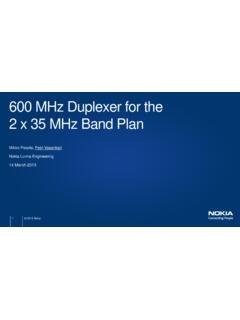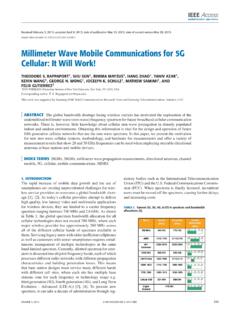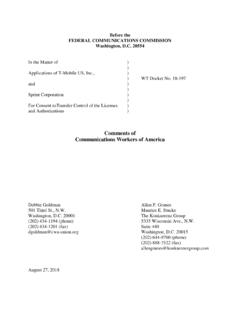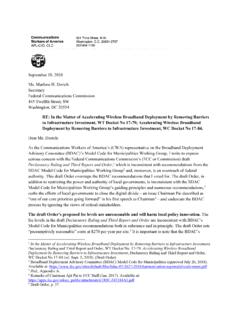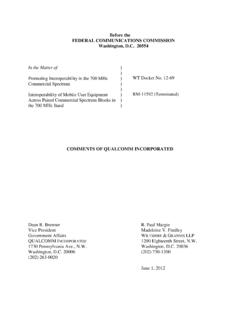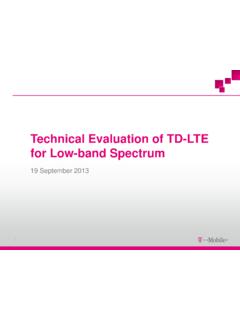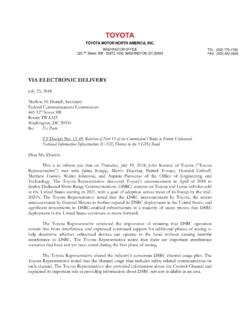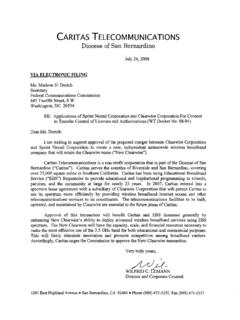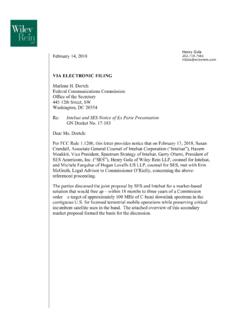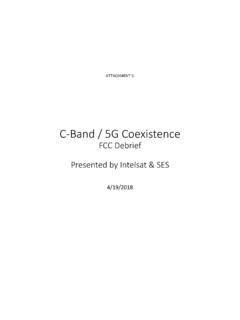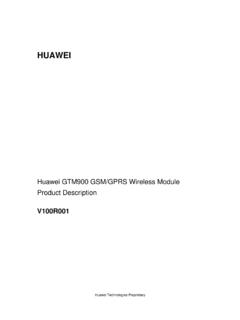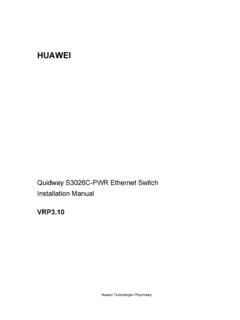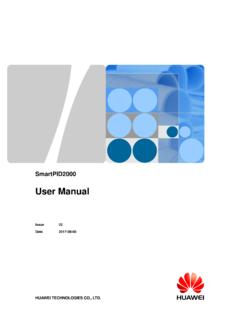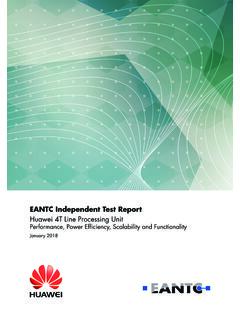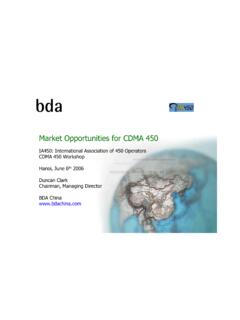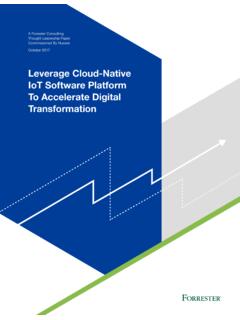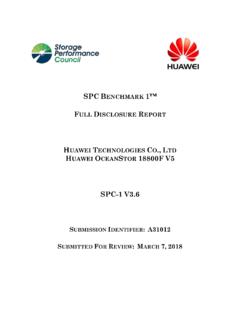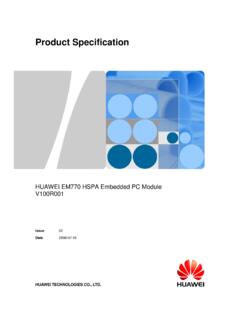Transcription of Before the FEDERAL COMMUNICATIONS …
1 Before the FEDERAL COMMUNICATIONS COMMISSION Washington, 20554 ) In the Matter of ) ) Protecting Against National Security ) WC Docket No. 18-89 Threats to the COMMUNICATIONS Supply ) Chain Through FCC Programs ) ) COMMENTS OF huawei TECHNOLOGIES CO., LTD AND huawei TECHNOLOGIES USA, INC. Glen D. NagerBruce A. Olcott Ryan J. Watson Vivek SuriJONES DAY51 Louisiana Ave, NWWashington, 20001(202) 879-3939 (202) 626-1700 (Fax) Andrew D. Lipman Russell M. Blau David B. Salmons Catherine Kuersten MORGAN,LEWIS &BOCKIUS LLP 1111 Pennsylvania Ave, NW Washington, DC 20004 (202) 739-3000 (202) 739-3001 (Fax) Counsel to huawei Technologies Co., Ltd. and huawei Technologies USA, Inc. Date: June 1, 2018 - i - SUMMARY huawei Technologies Co., Ltd. and huawei Technologies USA, Inc. ( huawei ) applaud the Commission s objectives of protecting the nation s COMMUNICATIONS networks and supply chain, but the mechanism by which the Commission aims to do so , blacklisting a handful of suppliers is both improper and imprudent for multiple reasons.
2 This proposal exceeds the statu-tory authority granted to the Commission; is arbitrary and capricious; will cause costs far in excess of any slight benefits; violates constitutional and statutory procedural requirements; and relies on unverified and unsupportable factual allegations. The Commission should not adopt its proposed rule. First, the Commission lacks authority to prohibit USF recipients from buying equipment on the basis that a seller allegedly poses a risk to national security. To the contrary, the proposed rule would circumvent the statutory principles governing the USF, which seek to ensure that rea-sonably priced, high quality telecommunications and broadband services are available in rural, insular, and high cost areas. The COMMUNICATIONS Act directs the Commission to base its USF program on specific, enumerated principles none of which reference national security concerns.
3 The omission reflects Congressional intent to withhold this authority from the Commission, as it has in the same Act explicitly empowered the President, as Commander in Chief, to make policies in furtherance of national security. Courts have long declined to interpret a statute as conferring authority on an agency that Congress did not intend to grant. The Commission s cited sources of authority for its NPRM are unpersuasive and fail in the face of statutory language expressly defin-ing the scope of the agency s universal service authority. Second, the proposed rule is both vague and irrational, and contravenes the reasoned deci-sionmaking scheme prescribed by the Administrative Procedure Act. The NPRM does not define - ii - national security or establish any criteria for deciding which companies to blacklist. If a com-pany is accused of being a threat to national security, the proposed rule offers neither a proce-dural vehicle nor a substantive standard by which it could challenge that accusation.
4 Furthermore, the proposed rule draws impermissible and irrational lines by targeting specific sellers, rather than equipment, apparently on the basis of their national origin. In doing so, the Commission ignores the realities of global telecommunications supply chains. The proposed rule would prohibit the use of USF funds to purchase equipment from companies such as huawei because its headquarters are in China, but would permit purchases from other companies with a substantial footprint in China, including multiple offices, manufacturing facilities, supply chain vendors, and even a joint venture with the Chinese Government. This is clear evidence that the proposed rule is arbitrary. The solu-tion is not to blacklist even more companies, but to identify and address actual threats to the supply chain without drawing such arbitrary and irrational lines. Third, the purported benefits of the proposed rule are speculative and outweighed by the substantial costs it would pose, indicating that the Commission lacks a rational basis to issue the rule.
5 To begin with, the Commission has no method to identify or evaluate the validity of an alleged threat to national security. The NPRM fails to assess the complexities of global supply chains, which make the wholesale blacklisting of companies based on their country of origin an ineffectual means of guarding against purported bad actors. The NPRM also does not take into consideration the degree of cybersecurity risk for USF recipients, many of whom are small, rural entities, school districts, or libraries, and not only represent a small fraction of telecommunications networks, but are also unlikely targets of cyberattacks. Conversely, the proposed rule would cause significant harm to the telecommunications market by decreasing competition and increasing costs to - iii - both USF recipients and American consumers. This, in turn, would impede the deployment of important emerging telecommunications technologies, such as 5G.
6 Fourth, the proposed rule deprives companies of notice and a meaningful hearing Before placing them on a blacklist that, by virtue of its very existence, causes injury to corporate reputa-tion. This would contravene the Due Process Clause, the COMMUNICATIONS Act, and the Adminis-trative Procedure Act, all of which guarantee a company the opportunity to review and respond to evidence against it. Moreover, under the Due Process Clause, the Commission as well as any other agency the Commission may consider delegating the task to is legally prohibited from us-ing rulemaking to brand a list of companies as national security threats and bar sale of their equipment to USF recipients. In fact, the Commission demonstrates no lawful, reasoned method for determining whether a company is a national security threat, instead impermissibly proposing to use existing statutes enacted for entirely different purposes, such as the 2018 National Defense Authorization Act, or even other agency decisions to debar a company.
7 Last, the Commission lacks the factual basis to designate huawei as a threat as it clearly intends to do under proposed rule. The Commission does not analyze huawei s longstanding com-mitment to the security of telecommunications networks nor its continued, active participation in improving global cybersecurity standards. Instead, it prejudges huawei wholly on the location of its headquarters. The Commission provides no evidence that huawei equipment poses, or has posed, a national security threat and instead relies entirely on unspecified and unverified allega-tions, primarily a 2012 report from the House Permanent Select Committee on Intelligence that misinterprets an outdated Chinese law no longer in existence. Furthermore, not only does Chinese law not provide the Chinese government with the authority to interfere in private companies, but it also offers substantial protection for corporate enterprises from the government.
8 huawei has not - iv - engaged in harmful conduct, and the Commission can point to no rational, factual reasons to be-lieve that it may do so at some theoretical point in the future. huawei is committed to ensuring the security and integrity of COMMUNICATIONS networks and the telecommunications supply chain. However, while huawei fully supports the Commis-sion s intent behind the NPRM, it cannot support a rulemaking that is irrational, arbitrary, divorced from the facts, and contrary to laws and the Constitution. As such, huawei urges the Com-mission to decline to adopt the proposed rule and terminate this rulemaking proceeding. - v - table of Contents .. S INTEREST IN THE PROPOSED RULE .. Technologies Co., Ltd.: Business Overview .. Global Cybersecurity Policies .. Operations .. Technologies USA Cybersecurity Policies .. FCC LACKS STATUTORY AUTHORITY TO RESTRICT THE USE OF USF FUNDS ON THE BASIS OF NATIONAL-SECURITY CONCERNS.
9 Commission Lacks Authority to Adopt Universal-Service Policies in the Supposed Name of Promoting National Security .. of Section 254.. of Administrative Law.. Commission s Contrary Arguments Are Unpersuasive .. 201(b) and 254(c)(1)(D).. 254(b)(7).. 254(e).. 256 policy goals .. of national security in other settings .. 338. National Security.. PROPOSED RULE IS ARBITRARY AND CAPRICIOUS .. Proposed Rule Fails to Meet the Requirements of Notice-and-Comment Rulemaking and Is Arbitrary and Capricious Because It Is Unduly Vague and Offers No Meaningful Guidance to Affected Parties .. Proposed Rule is Arbitrary and Capricious Because it Draws Irrational Lines .. proposed rule irrationally targets particular sellers rather than equipment .. 38- vi - proposed rule impermissibly ignores the realities of telecommunications supply chains .. proposed rule utilizes arbitrary methods to identify blacklisted sellers.
10 Proposed rule impermissibly equates a seller s national origin with a risk to national security .. Proposed Rule is Arbitrary and Capricious Because it Reflects Irrational Decisionmaking .. Proposed Rule Contradicts the Scheme of Reasoned Decisionmaking Established by the APA .. PROPOSED RULE CANNOT BE JUSTIFIED BY COST BENEFIT ANALYSIS .. Purported Benefits of the Rule Are Speculative and Insubstantial .. Costs of the Proposed Rule Would Be Massive .. COMMISSION MAY EXCLUDE A COMPANY FROM SELLING EQUIPMENT TO USF RECIPIENTS ONLY AFTER NOTICE AND A MEANINGFUL HEARING .. Due Process Clause Guarantees a Company Notice and a Meaningful Individualized Hearing Before the Commission Labels It a National Security Threat and Restricts the Purchase of Its Equipment .. Due Process Clause guarantees a company notice and a meaningful hearing Before it is blacklisted .. Due Process Clause requires that the company have an opportunity to review and respond to the evidence against it.
